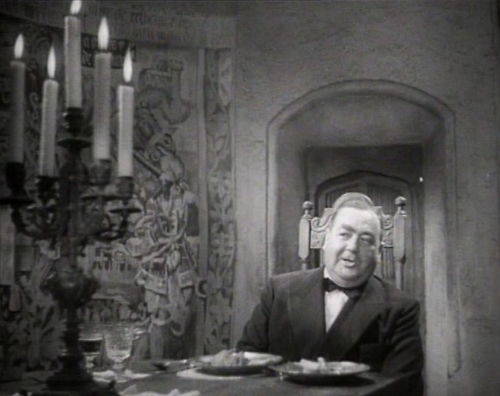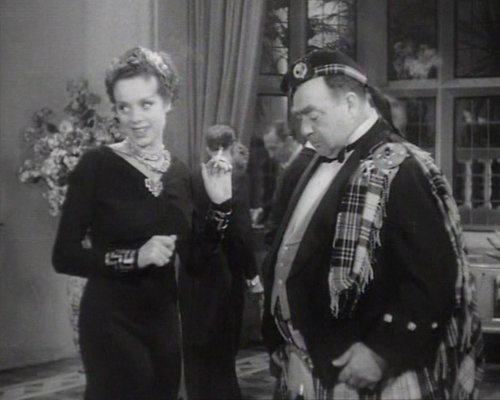
Rene Clair’s “American period is generally blamed for his decline,” Andrew Sarris notes in The American Cinema, before averring that said decline began before he “left Paris for Hollywood’s lucre.” Could it then be fairer to say that after the likes of ‘23’s Paris Qui Dort, ‘27’s The Italian Straw Hat, ‘31’s Le Million, and ‘32’s A Nous La Liberte (which influenced Chaplin), the director, who practiced a brand of surrealism-with-slapstick tinted by a particularly Gallic delicacy and whimsy, ran out of innovations and henceforth had to fall back on mere wit?The fact of the matter is, 1935’s The Ghost Goes West, Clair’s first English-language film—not a Hollywood production but a British-based Alexander Korda one, with sets by Vincent and a script by Clair and Robert E. Sherwood—doesn’t bear much of a resemblance to the Clair films that came before it. There is one impeccably timed gag involving a barrel of gunpowder in the film’s opening, and a bracingly jittery characterization of a dotty psychic by Elsa Lanchester late in the picture, but by and large, despite its supernatural theme, The Ghost Goes West trades the surreal for the genteel.Robert Donat stars in a dual role as Murdoch Glourie, the ghost haunting Scottish Glourie Castle, and Donald Glourie, the castle’s ne’ee-do-well contemporary resident. Donat is particularly game in the sequence explaining how Glourie came to be a ghost. As he goes off to war, his crotchety father instructs him to bash the first member of the rival McClagen clan he sees. “But father, I thought I was supposed to fight the English,” Murdoch whines, in a voice as weedy as Terry Jones’ anemic prince asking “What, the curtains?” in Monty Python and the Holy Grail. Murdoch instead goes off to woo a maid, again, weedily, and when he meets his ignominious end his now-late father’s spirit tells him he’s condemned to haunt Glourie castle until he’s faced down a McClagen.And so he’s a-haunting when charming American tourist Peggy Martin (Jean Parker) comes to the castle some two centuries later, her millionaire father (Eugene Pallette) in tow. An archetypal ‘30’s-picture amiable vulgarian nouveau riche type, Martin decides not just to buy the castle but to import it brick-by-brick to Florida, where he’ll reassemble it with all mod cons added. (Importing British castles in this manner was a mini-trend among American millionaires in the early 20th century.)

The ghost of Murdoch—who’s been romancing Peggy with a great deal of confidence (he seems to have read some self-improvement books in the 200-year-interval) even as the flesh-and-blood Donald fumbles with his own efforts in that respect, much to her confusion—is quite befuddled as the crated bricks are loaded onto an ocean liner—a Korda miniature, as is the New York skyline the liner eventually greets.The castle and its ghost become a tabloid scandal en route, and a bunch of gangsters assail the warehouse where the castle’s bricks are in storage, resulting in a gun battle with police. As the bullets fly through his transparent ectoplasm, Murdoch moans, “I don’t like America.” But whatever cross-cultural satiric potential the film has diffuses as it races to resolve two plot points—Donald’s pursuit of Peggy, and Murdoch’s pursuit of eternal rest. Along the way, we’re treated to Lanchester’s tetchy cameo and the sight of a New-Orleans-style big band in kilts. It’s all light and enjoyable enough—how can one not derive some pleasure from a Eugene Pallette picture?—but so insubstantial it’s hard to credit that it was Britain’s biggest box office hit of 1936 (it opened in December of ’35).

Better work from Clair in English was to come—the Marlene Dietrich starrer The Flame of New Orleans in ’41, the supernatural-themed I Married A Witch (not-so-secret weapon: Veronica Lake) in ’42, the underrated (to my mind) It Happened Tomorrow in ’44, and the best of the lot, the acerbic, romping 1945 Agatha Christie adaptation And Then There Were None, perhaps his most cynical picture.The British Region 2 Netwerk disc of this film is watchable—just. Image quality is soft enough to suggest a third-generation source, and speckles and dirt are visible throughout. The disc has one notable supplemental feature, the film’s script in PDF format, but that’s only accessible via a computer with a region-free DVD drive.